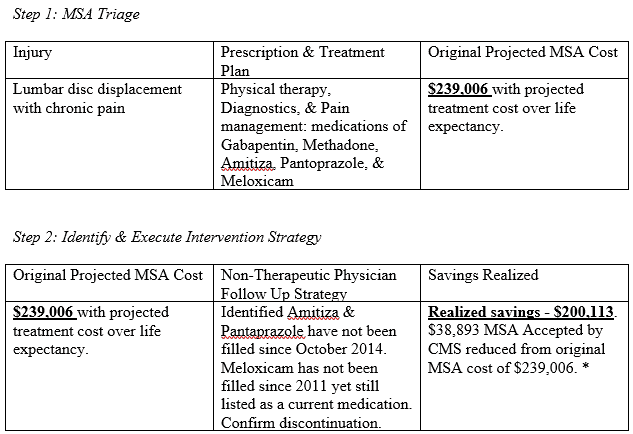
Back to the Basics of MSA Allocation Preparation
There is a certain art to preparing and writing a MSA allocation. This includes the threshold matter of ensuring the allocation is reasonable, and will be accepted if it is sent for voluntary review and approval by CMS.
When writing an accurate MSA allocation, the person preparing the report will rely on some or all of the following materials and records:
- All medical records for the last two years of treatment related to the WC claim*;
- A complete claim payment history record from the insurance carrier;
- A separate pharmacy payment history report;
- Draft settlement documents, prior settlements, court orders and decisions and other legal documents;
- A First Report of Injury; and
- Explanation of accepted, disputed and denied body parts, along with ICD-10 codes.
* “Treatment records” consist of all medical records for treatment to the claimed body part or condition even if the employer or carrier did not pay for the treatment. Also, CMS does not consider an Independent Medical Examination report a “medical record” for purposes of allocation review and approval.
Click Link to Access Free PDF Download
“8 ‘Think Outside the Box’ Tactics to Settle Workers’ Comp Claims”
Cost Drivers in MSA Allocations
Medical costs in workers’ compensation claims continue to rise with a large portion of future medical tied to pharmacy costs. A September 2016 NCCI research brief states “for every $100 of medical services paid on claims older than 10 years, approximately $45 to $50 will be for prescription drugs.” This leads to an increased future medical component that must be considered as a part of every settlement. Members of the claims management team should monitor their files for the following issues:
- Pharmacy savings opportunities: Medications that are prescribed, but never actually filled by the employee, prescribed medications that have been discontinued, and brand name drugs that can be replaced with generics.
- Medical savings opportunities: Ongoing and prolonged treatment by a primary care doctor for injuries that should require a specialist, gaps in a patient’s medical record and treatment recommendations which are no longer considered viable, such as a spinal cord stimulator.
Physician Intervention – Brand vs. Generic Drugs
There are many opportunities for members of the claim management team to reduce the cost of a MSA allocation and promote a culture of settlement. One such strategy is directly contacting the employee’s treating physician to follow up on medical cost driver red flags and savings opportunities. As a note of caution, this should be done in conformance with federal and state law and may require the approval of the injured worker.
A classic example of when direct physician intervention is appropriate comes after a review of prescription records. Often the physician prescribes a certain brand name medication versus a therapeutically equivalent generic. While not always the case, generics are often considerably less expensive and offer the same medicinal attributes as the brand name.
An experienced MSA service provider will notice this opportunity by reviewing the “dispense as written” (DAW) codes in medical and pharmacy records. They will position your file for the cost-saving measure to recommend direct contact with the physician to revise the prescription for the cheaper alternative. Communication between the parties allows the necessary change to occur. The cost savings will be realized once that cheaper alternative is filled by the pharmacy and a paper trail is created. This allows the allocator to document the file and justify the lower prescription drug costs.
Physician Intervention – Discontinued Medications
Another opportunity for MSA cost reduction is to identify and confirm the discontinuation of medications previously prescribed.
Medicare Set-asides: A Case Study

*case study provided by Tower MSA Partners
The main cost driver in this MSA allocation was the cost of prescription drugs. In the above example, a review of the pharmacy recorded revealed Amitiza, Pantaprazole, and Meloxicam were prescribed, but had not been filled for an extended period of time. This represented a significant opportunity for savings by directly following up with the treating physician in writing to confirm these prescriptions had been discontinued. This confirmation allowed the prescriptions to be removed from the allocation, resulting in $200,113 in savings.
Conclusions
The ever-increasing price of medicals on workers’ compensation presents a series of challenges for the claims management team. In order to avoid over-allocating for treatment and prescription medications, leverage a proactive MSA service provider to identify MSA savings opportunities and intervene with the treating physician. This proactive approach often results in a lower MSA allocation with realized cost savings to the claims management team.
For additional information on workers’ compensation cost containment best practices, register as a guest for our next live stream training.

Contact: mstack@reduceyourworkerscomp.com.
Workers’ Comp Roundup Blog: https://blog.reduceyourworkerscomp.com/
Live Stream WC Training: http://workerscompclub.com/livestreamtraining
©2017 Amaxx LLC. All rights reserved under International Copyright Law.
Do not use this information without independent verification. All state laws vary. You should consult with your insurance broker, attorney, or qualified professional.
























